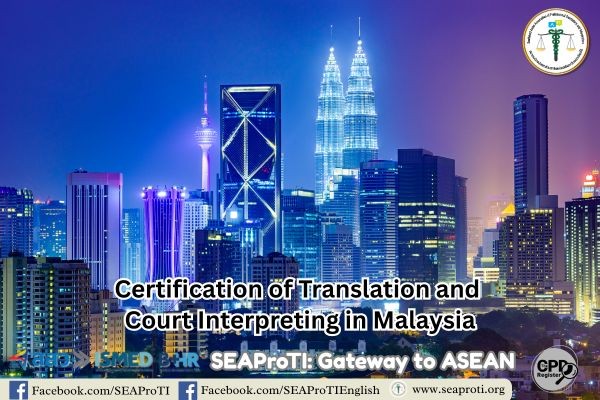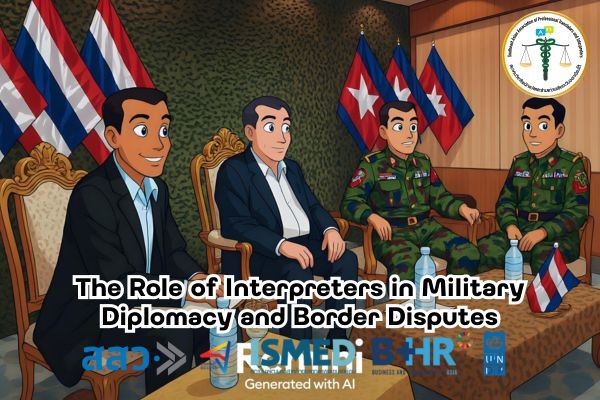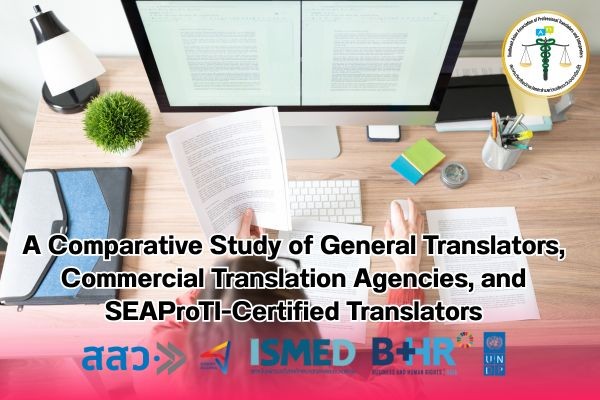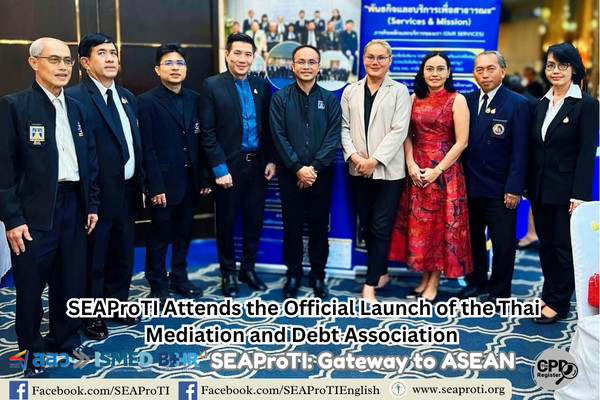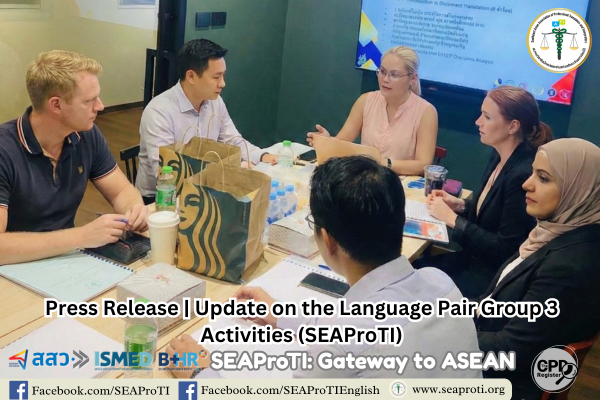Certification of Translation and Court Interpreting in Malaysia
15 October 2025, Bangkok – The certification of translation and court interpreting in Malaysia plays a vital role in ensuring the accuracy, reliability, and admissibility of linguistic evidence in legal and administrative processes. This article examines the current framework for translator and interpreter certification in Malaysia, focusing on institutional practices, procedural requirements, and the relationship between professional competence and legal accountability. It also identifies existing gaps and suggests directions for future development aligned with international standards of professionalization.
Language mediation in legal and administrative contexts demands both linguistic precision and procedural integrity. In Malaysia, where Malay, English, and numerous minority languages coexist, certified translation and court interpreting are indispensable to justice administration, immigration, education, and commerce. However, the regulatory and professional frameworks for these services remain partially fragmented, combining formal institutional recognition with case-by-case acceptance by government agencies and courts (Ibrahim, 2007).
A certified translation in Malaysia refers to a translation accompanied by a signed statement or affidavit by a qualified translator declaring that the translation is accurate and complete. Such certification is often required for documents submitted to the courts, embassies, educational institutions, and government agencies.
Recognized Certifying Institutions
Malaysia does not have a single statutory body governing translators, but several recognized institutions provide legitimacy to certified translations, including:
- Institut Terjemahan & Buku Malaysia (ITBM) – the national institute for translation and publications;
- Dewan Bahasa dan Pustaka (DBP) – the national language and literature authority;
- Malaysian Translators Association (MTA) – a professional body for translators and interpreters.
Certified translations must include (a) a translator’s declaration of accuracy, (b) signature and seal, and (c) identification details such as name, address, and qualifications (Translife Translation, 2025). For international use, such as submission to foreign embassies, further notarization or attestation by the Ministry of Foreign Affairs may be required (Certified Translation Co., 2024).
Translation Certification in Judicial Proceedings
The Rules of Court 2012, particularly Order 92 Rule 1, require documents submitted in foreign languages to be accompanied by accurate Malay or English translations. When such translations are disputed, the translator may be called to affirm an affidavit verifying their competence and the translation’s accuracy.
For example, in the High Courts of Peninsular Malaysia, documents are generally required in Malay with an English translation attached, while in Sabah and Sarawak, English remains the dominant working language, with Malay translations added when necessary. Courts often recognize translations produced by ITBM or certified members of MTA as “authoritative”.
Court Interpreting in Malaysia
Court interpreters play a crucial role in facilitating oral communication between judges, witnesses, and defendants who do not share a common language. Their role extends beyond linguistic conversion to ensuring that all participants fully comprehend the proceedings (BAC Education, 2025).
Institutional Framework
The Malaysian Judiciary administers interpreter services through platforms such as e-Jurubahasa, which manages interpreter assignments across different languages and courts (Kuala Lumpur Courts, 2025). Interpreters may be employed full-time within the judicial system or contracted externally for less common languages.
Qualifications and Training
Historically, the minimum qualification for court interpreters was the Malaysian Certificate of Education (MCE) with credits in Malay and English, but higher courts now prefer interpreters with tertiary education and language proficiency training (Ibrahim, 2007). Despite the essential nature of their work, there is no national certification or licensing system comparable to the NAATI model in Australia or CIOL in the United Kingdom (SEAProTI, 2025).
Challenges and Gaps
The current framework reveals several systemic gaps:
- Absence of a unified certification standard. Translation certification is based on institutional reputation rather than statutory regulation.
- Limited professional recognition for interpreters. Court interpreters rely on civil service criteria rather than standardized professional examinations.
- Inconsistent training pathways. There is no mandatory interpreter training curriculum or continuing professional development (CPD) requirement.
- Judicial reliance on affidavit-based verification. The authenticity of translations is ensured through legal affidavits rather than independent certification systems.
Conclusion
Malaysia’s approach to translation and interpreting certification reflects a hybrid model—part administrative, part professional. While the system functions effectively within the judiciary and government sectors, it lacks the legal and institutional coherence required to sustain professional recognition and quality assurance. The establishment of a statutory certification authority or an ASEAN-level register of certified translators and interpreters would not only harmonize standards but also enhance cross-border legal cooperation and multilingual justice.
References
- BAC Education. (2025). A clearer understanding: Why legal interpreting is important. https://www.bac.edu.my
- Certified Translation Co. (2024). Certified translation services in Malaysia. https://certified-translation.co
- Ibrahim, N. (2007). Court interpreting in Malaysia: Problems and challenges. Puentes: Revista de Traducción e Interpretación, 7(1), 125–136 https://wpd.ugr.es/~greti/revista-puentes/pub7/09-Noraini-Ibrahim.pdf
- Kuala Lumpur Courts. (2025). Practicing Certificates and e-Jurubahasa information. https://kl.kehakiman.gov.my
- SEAProTI. (2025). Peer certification system for translators and interpreters in Southeast Asia. Southeast Asian Association of Professional Translators and Interpreters.
- Translife Translation. (2025). Certified translation services Malaysia. https://www.translife-translation.com
About Certified Translators, Translation Certifiers, and Certified Interpreters of SEAProTI
The Southeast Asian Association of Professional Translators and Interpreters (SEAProTI) has formally announced the qualifications and requirements for registration of Certified Translators, Translation Certification Providers, and Certified Interpreters in Sections 9 and 10 of the Royal Gazette, published by the Secretariat of the Cabinet, Office of the Prime Minister of Thailand, on 25 July 2024 (Vol. 141, Part 66 Ng, p. 100). Certified Translators, Translation Certification Providers, and Certified Interpreters
The Council of State has proposed the enactment of a Royal Decree, granting registered translators and recognized translation certifiers from professional associations or accredited language institutions the authority to provide legally valid translation certification (Letter to SEAProTI dated April 28, 2025)
SEAProTI is the first professional association in Thailand and Southeast Asia to implement a comprehensive certification system for translators, certifiers, and interpreters.
Head Office: Baan Ratchakru Building, No. 33, Room 402, Soi Phahonyothin 5, Phahonyothin Road, Phaya Thai District, Bangkok 10400, Thailand
Email: hello@seaproti.com | Tel.: (+66) 2-114-3128 (Office hours: Mon–Fri, 09:00–17:00)
การสื่อสารระหว่างภาษาภายใต้บริบททางกฎหมายและการบริหารต้องอาศัยทั้งความแม่นยำทางภาษาและความถูกต้องตามกระบวนการ ในประเทศมาเลเซียซึ่งมีการใช้ภาษามลายู ภาษาอังกฤษ และภาษาของชนกลุ่มน้อยหลายภาษา การแปลเอกสารที่ได้รับการรับรอง (certified translation) และการล่ามในศาล (court interpreting) เป็นสิ่งจำเป็นต่อการอำนวยความยุติธรรม การตรวจคนเข้าเมือง การศึกษา และธุรกิจ อย่างไรก็ตาม กรอบการกำกับดูแลและมาตรฐานวิชาชีพในปัจจุบันยังคงมีลักษณะกระจัดกระจาย โดยผสมผสานระหว่างการรับรองโดยสถาบันและการยอมรับเฉพาะกรณีจากหน่วยงานรัฐและศาล (Ibrahim, 2007)
การแปลเอกสารที่ได้รับการรับรอง (Certified Translation) หมายถึง การแปลที่มีคำรับรองหรือคำให้การเป็นลายลักษณ์อักษรโดยนักแปลที่มีคุณสมบัติรับรองความถูกต้องและความครบถ้วนของเนื้อหาต้นฉบับ (MyLegalTrans, 2025a) การแปลประเภทนี้เป็นที่ต้องการในกระบวนการยื่นเอกสารต่อศาล สถานทูต สถาบันการศึกษา และหน่วยงานของรัฐ
สถาบันที่มีอำนาจรับรอง
แม้ประเทศมาเลเซียจะยังไม่มีหน่วยงานกลางกำกับดูแลนักแปลโดยเฉพาะ แต่สถาบันบางแห่งได้รับการยอมรับในฐานะองค์กรที่สามารถออกหนังสือรับรองการแปลได้อย่างเป็นทางการ ได้แก่
- Institut Terjemahan & Buku Malaysia (ITBM) – สถาบันแปลและสำนักพิมพ์แห่งชาติ
- Dewan Bahasa dan Pustaka (DBP) – สำนักภาษามลายูและวรรณคดีแห่งชาติ
- Malaysian Translators Association (MTA) – สมาคมนักแปลแห่งประเทศมาเลเซีย
การแปลที่ได้รับตราประทับหรือการรับรองจากสถาบันเหล่านี้มักได้รับการยอมรับในประเทศและต่างประเทศ
เอกสารแปลที่ได้รับการรับรองต้องประกอบด้วย (ก) คำรับรองความถูกต้องจากนักแปล (ข) ลายเซ็นและตราประทับ และ (ค) ข้อมูลประจำตัวของนักแปล เช่น ชื่อ ที่อยู่ และคุณวุฒิ (Translife Translation, 2025)
สำหรับเอกสารที่ใช้ในต่างประเทศ อาจต้องผ่านการ รับรองจากทนายความหรือกระทรวงการต่างประเทศ เพื่อยืนยันความถูกต้องของการแปล (Certified Translation Co., 2024)
การรับรองการแปลในกระบวนการศาล
กฎระเบียบศาล พ.ศ. 2555 (Rules of Court 2012) โดยเฉพาะข้อ 92(1) กำหนดว่าเอกสารที่จัดทำขึ้นเป็นภาษาต่างประเทศต้องมีฉบับแปลเป็นภาษามลายูหรือภาษาอังกฤษแนบมาด้วย หากมีข้อโต้แย้งเกี่ยวกับความถูกต้องของการแปล ศาลสามารถเรียกนักแปลมาให้การยืนยันคุณสมบัติและความถูกต้องของการแปลได้
ในศาลสูงของ มาเลเซียฝั่งตะวันตก (Peninsular Malaysia) เอกสารส่วนใหญ่ต้องเป็นภาษามลายูพร้อมการแปลภาษาอังกฤษแนบมา ส่วนใน รัฐซาบาห์และซาราวัก (East Malaysia) ศาลมักใช้ภาษาอังกฤษเป็นหลักและต้องมีฉบับแปลเป็นภาษามลายูประกอบ ศาลให้การยอมรับการแปลโดย ITBM หรือสมาชิกที่ได้รับการรับรองจาก MTA ว่าเป็น “การแปลที่เชื่อถือได้”
การล่ามในศาลของประเทศมาเลเซีย
การล่ามในศาลมีบทบาทสำคัญในการอำนวยความเข้าใจระหว่างผู้พิพากษา พยาน และจำเลยที่ไม่สามารถสื่อสารด้วยภาษาร่วมเดียวกันได้ ล่ามไม่เพียงแต่ทำหน้าที่แปลภาษา แต่ยังช่วยให้คู่ความทุกฝ่ายเข้าใจสาระสำคัญของกระบวนการพิจารณาคดีอย่างเท่าเทียม (BAC Education, 2025)
โครงสร้างสถาบัน
ฝ่ายตุลาการของมาเลเซียบริหารจัดการบริการล่ามผ่านระบบ e-Jurubahasa ซึ่งเป็นแพลตฟอร์มบริหารจัดการการร้องขอล่ามในแต่ละศาลและภาษาต่าง ๆ (Kuala Lumpur Courts, 2025) ล่ามบางส่วนเป็นข้าราชการประจำศาล ขณะที่บางส่วนเป็นผู้รับจ้างภายนอกในภาษาหายากหรือเฉพาะทาง
คุณสมบัติและการฝึกอบรม
ในอดีต คุณสมบัติเบื้องต้นของล่ามศาลคือวุฒิ Malaysian Certificate of Education (MCE) ที่มีคะแนนดีในวิชาภาษามลายูและภาษาอังกฤษ แต่ในปัจจุบันศาลระดับสูงมักต้องการล่ามที่มีการศึกษาระดับอุดมศึกษาและผ่านการฝึกอบรมด้านภาษาโดยเฉพาะ (Ibrahim, 2007)
อย่างไรก็ตาม ปัจจุบันยังไม่มีระบบการสอบรับรองระดับชาติ (national certification) สำหรับล่ามศาล เช่นเดียวกับระบบ NAATI ของออสเตรเลีย หรือ CIOL ของสหราชอาณาจักร (SEAProTI, 2025)
ปัญหาและช่องว่างในระบบ
การศึกษาพบว่าระบบการรับรองการแปลและการล่ามในมาเลเซียยังมีข้อจำกัดหลายประการ ได้แก่
- ขาดมาตรฐานการรับรองระดับชาติ – การรับรองยังอิงกับชื่อเสียงของสถาบันมากกว่ากฎหมายเฉพาะ
- ขาดการยอมรับในวิชาชีพล่ามศาลอย่างชัดเจน – การแต่งตั้งล่ามขึ้นอยู่กับเกณฑ์ราชการมากกว่ามาตรฐานวิชาชีพ
- ขาดระบบการฝึกอบรมและพัฒนาอย่างต่อเนื่อง (CPD)
- กระบวนการตรวจสอบคุณภาพผ่านคำให้การรับรอง (affidavit) แทนการสอบหรือระบบใบอนุญาต
บทสรุป
แนวทางของมาเลเซียในการรับรองการแปลและการล่ามในศาลเป็นลักษณะผสมระหว่างการบริหารและการกำกับดูแลเชิงวิชาชีพ แม้ระบบจะดำเนินงานได้ในทางปฏิบัติ แต่ยังขาดความเป็นเอกภาพทางกฎหมายและสถาบันเพื่อสร้างการยอมรับในระดับสากล การจัดตั้งหน่วยงานกำกับดูแลระดับชาติหรือทะเบียนนักแปลและล่ามอาเซียน จะช่วยสร้างมาตรฐานร่วม เพิ่มความเชื่อมั่นทางวิชาชีพ และส่งเสริมความร่วมมือข้ามพรมแดนในด้านกฎหมายและกระบวนการยุติธรรมพหุภาษา
- BAC Education. (2025). A clearer understanding: Why legal interpreting is important. https://www.bac.edu.my
- Certified Translation Co. (2024). Certified translation services in Malaysia. https://certified-translation.co
- Ibrahim, N. (2007). Court interpreting in Malaysia: Problems and challenges. Puentes: Revista de Traducción e Interpretación, 7(1), 125–136. https://wpd.ugr.es/~greti/revista-puentes/pub7/09-Noraini-Ibrahim.pdf
- Kuala Lumpur Courts. (2025). Practicing Certificates and e-Jurubahasa information. https://kl.kehakiman.gov.my
- SEAProTI. (2025). Peer certification system for translators and interpreters in Southeast Asia. Southeast Asian Association of Professional Translators and Interpreters.
- Translife Translation. (2025). Certified translation services Malaysia. https://www.translife-translation.com
เกี่ยวกับนักแปลรับรอง ผู้รับรองการแปล และล่ามรับรองของสมาคมวิชาชีพนักแปลและล่ามแห่งเอเชียตะวันออกเฉียงใต้
สมาคมวิชาชีพนักแปลและล่ามแห่งเอเชียตะวันออกเฉียงใต้ (SEAProTI) ได้ประกาศหลักเกณฑ์และคุณสมบัติผู้ที่ขึ้นทะเบียนเป็น “นักแปลรับรอง (Certified Translators) และผู้รับรองการแปล (Translation Certification Providers) และล่ามรับรอง (Certified Interpreters)” ของสมาคม หมวดที่ 9 และหมวดที่ 10 ในราชกิจจานุเบกษา ของสำนักเลขาธิการคณะรัฐมนตรี ในสำนักนายกรัฐมนตรี แห่งราชอาณาจักรไทย ลงวันที่ 25 ก.ค. 2567 เล่มที่ 141 ตอนที่ 66 ง หน้า 100 อ่านฉบับเต็มได้ที่: นักแปลรับรอง ผู้รับรองการแปล และล่ามรับรอง
สำนักคณะกรรมการกฤษฎีกาเสนอให้ตราเป็นพระราชกฤษฎีกา โดยกำหนดให้นักแปลที่ขึ้นทะเบียน รวมถึงผู้รับรองการแปลจากสมาคมวิชาชีพหรือสถาบันสอนภาษาที่มีการอบรมและขึ้นทะเบียน สามารถรับรองคำแปลได้ (จดหมายถึงสมาคม SEAProTI ลงวันที่ 28 เม.ย. 2568)
สมาคมวิชาชีพนักแปลและล่ามแห่งเอเชียตะวันออกเฉียงใต้ เป็นสมาคมวิชาชีพแห่งแรกในประเทศไทยและภูมิภาคเอเชียตะวันออกเฉียงใต้ที่มีระบบรับรองนักแปลรับรอง ผู้รับรองการแปล และล่ามรับรอง
สำนักงานใหญ่: อาคารบ้านราชครู เลขที่ 33 ห้อง 402 ซอยพหลโยธิน 5 ถนนพหลโยธิน แขวงพญาไท เขตพญาไท กรุงเทพมหานคร 10400 ประเทศไทย
อีเมล: hello@seaproti.com โทรศัพท์: (+66) 2-114-3128 (เวลาทำการ: วันจันทร์–วันศุกร์ เวลา 09.00–17.00 น.)


